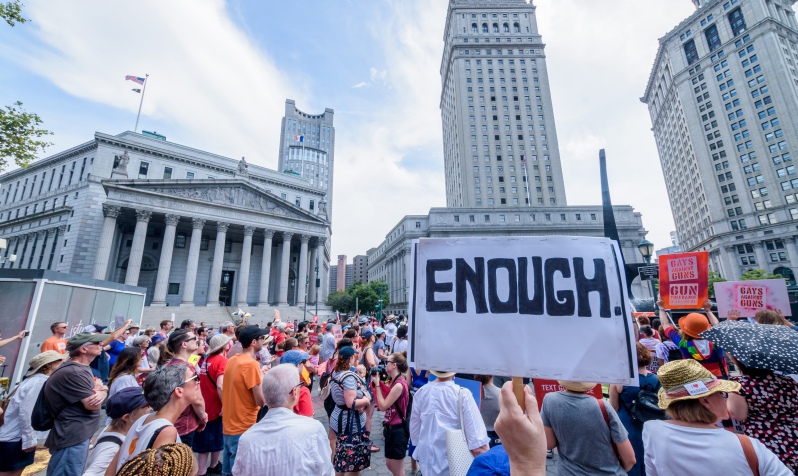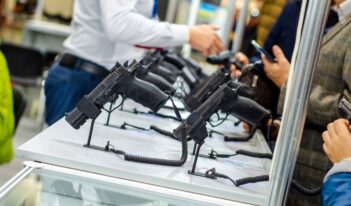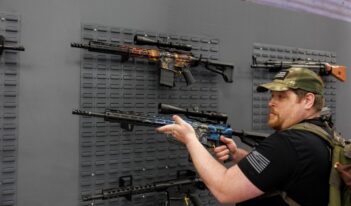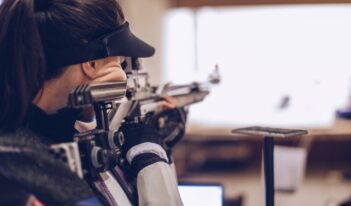
New York lawmakers’ attempt to regulate guns will result in significant legal challenges.
New York Governor Andrew Cuomo signed a bill on July 6 amending the state’s public nuisance law to include the illegal use of firearms as a way for victims of gun violence to hold gun sellers accountable for their harm. New York lawmakers aim to exploit an exception to the statutory immunity that Congress conferred upon the gun industry in 2005 to protect it from civil lawsuits arising out of the criminal misuse of weapons. To succeed, New York’s bold new attempt to end gun industry immunity will have to overcome several legal challenges.
The amended New York statute subjects gun sellers—including manufacturers—to liability for public nuisance if they fail to implement “reasonable controls” to prevent the unlawful sale, possession, or use of firearms within the state. The law specifies that reasonable controls include implementing practices to prevent illegal retail sales and secure inventory from theft. Under the law, both private individuals and public officials can bring claims seeking compensatory damages, restitution, and injunctions for abatement of the nuisance.
Lawsuits against gun sellers for public nuisance are not new. Individual gun violence victims, civic organizations such as the NAACP, and big-city mayors started filling public nuisance claims against gun industry defendants in the late 1990s. Congress put an end to this litigation in 2005 when it passed the Protection of Lawful Commerce in Arms Act (PLCAA), which granted gun sellers immunity from liability arising out of criminal misuse of weapons.
But PLCAA immunity is not absolute. Notably, a seller is not immune from liability if it “knowingly violated a state or federal statute applicable to the sale or marketing” of firearms. Consequently, following the passage of PLCAA, plaintiffs in lawsuits filed against gun manufacturers argued that certain industry marketing, distribution, and sales practices constituted a public nuisance in violation of state public nuisance statutes. Federal appellate courts in New York and California, however, rejected this argument, holding that public nuisance laws did not qualify for this exception to PLCAA immunity because they were not specifically aimed at regulating firearms.
In response, New York has now amended its public nuisance statute specifically to regulate the marketing, distribution, and sale of firearms in an effort to qualify for this exception to PLCAA immunity. By defining a gun seller’s failure to take reasonable precautions to prevent illegal sales as a violation of the state’s public nuisance statute, New York lawmakers hope that the very public nuisance claims that Congress created the PLCAA to extinguish will now qualify for exemption from PLCAA immunity.
Moreover, New York lawmakers aim to regulate firearms sales beyond the state’s borders to stem the flow of illegal guns into the state. The amended statute cites data from the federal Bureau of Alcohol, Tobacco, Firearms, and Explosives which show that “74 percent of firearms used in crimes in New York are purchased outside of New York.” The law asserts that “those responsible for the illegal or unreasonable sale, manufacture, distribution, importing or marketing of firearms may be held liable for the public nuisance caused by such activities.”
Gun industry defendants will surely argue that allowing claims based on New York’s amended public nuisance statute contradicts the explicit purpose of PLCAA. The federal immunity statute states:
Businesses in the United States that are engaged in interstate and foreign commerce through the lawful design, manufacture, marketing, distribution, importation, or sale to the public of firearms or ammunition products that have been shipped or transported in interstate or foreign commerce are not, and should not, be liable for the harm caused by those who criminally or unlawfully misuse firearm products or ammunition products that function as designed and intended.
New York’s efforts to resurrect public nuisance litigation against the gun industry under an exception to PLCAA immunity could be fairly characterized as an attempt to subvert the will of Congress. At the same time, the plain language of PLCCA allows claims arising out of the violation of any statute that specifically applies to the sale of firearms—which is exactly what New York’s amended public nuisance law does. For conservative judges on the federal bench, this litigation will pit their expansive conceptions of federal regulatory preemption of state tort law against their allegiance to strict textualism in statutory interpretation.
Gun industry defendants are also sure to challenge New York’s authority to regulate out-of-state gun sales using state public nuisance litigation. It is doubtful that state courts outside of New York would enforce New York State court judgments, especially in the 34 states with laws shielding gun sellers from lawsuits arising out of criminal misuse of weapons—many of which are precisely where the out-of-state sales that concern New York take place.
Finally, gun industry defendants will argue that the Second Amendment limits litigation likely to restrict access to the lawful purchase of firearms and that imposing liability on gun sellers for the criminal misuse of firearms is likely to have that effect. The U.S. Supreme Court has held that the Second Amendment limits state interference with the right of individuals to own firearms “in common use” for “lawful purposes like self-defense.” If the Supreme Court believes that civil litigation is likely to prompt sellers to exit the market or drive them into bankruptcy, thereby restricting access to the legal purchase of weapons, the Court could strike down or limit the application of New York’s amended public nuisance statute.
First Amendment limits on libel claims provide a ready model for balancing the constitutional right to keep and bear arms against the right to recovery under civil law. However, precisely how the current Court’s conservative majority—many of whom have cultivated deep skepticism about the legitimacy of judge-made balancing and scrutiny tests—would go about accomplishing this task is entirely unclear.
Even if plaintiffs suing under New York’s amended public nuisance statute manage to clear each of these legal hurdles, it remains uncertain whether pressuring gun makers to supervise retail sellers is an effective strategy for reducing gun trafficking.
The industry itself appears to believe so. Since 2000, the National Shooting Sports Foundation (NSSF)—the firearm industry trade association—has partnered with the federal Bureau of Alcohol, Tobacco, Firearms, and Explosives to train retail gun store owners in how to reduce the risk of illegal straw purchases. In 2018, the NSSF launched another cooperative effort with the Bureau to train retail gun store owners in how to prevent theft of their inventory.
These programs appear to model the “reasonable controls” required of gun sellers by New York’s amended public nuisance statute. Unfortunately, the NSSF and the Bureau of Alcohol, Tobacco, Firearms, and Explosives have not presented any evidence demonstrating the impact of these programs on illegal sales, gun thefts, or, ultimately, firearms violence.
Will New York’s attempt to end gun industry immunity survive the inevitable legal challenges based on statutory interpretation, interstate federalism, and constitutional law? And even if it does, will it result in lower rates of gun violence? On these questions, the jury is still out.




